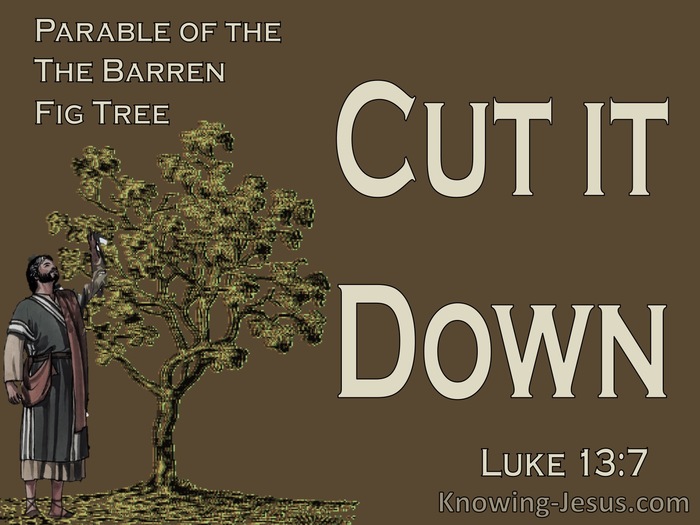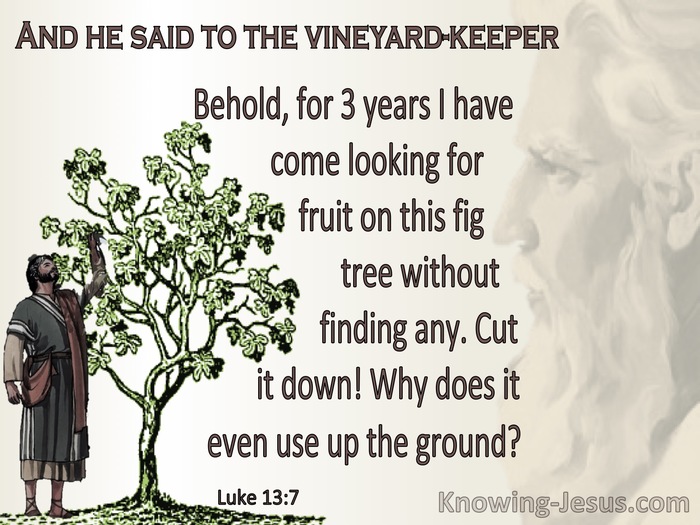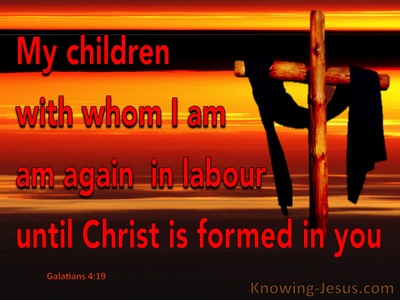◄ What Does Luke 13:7 Mean? ►
"And he said to the vineyard-keeper, 'Behold, for three years I have come looking for fruit on this fig tree without finding any. Cut it down! Why does it even use up the ground?'
Luke 13:7(NASB)
Verse of the Day
God knows the end from the beginning. He knew Israel would treat John the Baptist's call to repentance with disdain and reject Christ's Messianic claims. He knew Jesus would be despised by the Jews and crucified on a Roman cross. He knew He would come to His own people to claim His rightful position as King but would not be received. BUT God had to fulfil His promises to the patriarchs, which is why much of Christ's early teaching was only to the lost sheep of the house of Israel. Those who believed, received power to become children of God. They also became the first generation of believers in the Church era.
John was the last Old Testament prophet, who came in the spirit of Elijah to call the nation to REPENT, for the kingdom of heaven was near and their King was in their midst. However, they refused, even with Jesus teaching them Himself, and so the time arrived when His teaching style changed and Jesus started to talk in parables because Israel's ears were deaf, their eyes were blinded, and their hearts would not believe.
Many of Christ's parables painted a picture of Israel's disobedience, their hardness of heart, and the rejection of their Messiah. To those who believed in Him, the picture of the fruitless fig tree is obvious but to the unbelieving heart it appears obscure and puzzling. The fig tree is easily identified as Israel who was planted in their land by God, the vineyard owner. Jesus is characterised as the vine-dresser who sought in vain for fruit, during the three years of His earthly ministry, but found none. Although God ordered Him to cut down the unproductive tree, Jesus interceded on Israel's behalf, and one more year was granted for Him to try to get the tree to bear fruit (to get the nation to bring forth the fruit of righteousness).
The parable of the fruitless fig tree was a vivid picture of apostate Israel, who refused to repent of their sin. They could proudly predict an approaching storm or forecast a sunny day and yet failed to recognise the time of their visitation from God. Pride in their Jewish heritage caused them to be haughty instead of humble. They could not comprehend that they were sinners in need of salvation, nor could they recognise the barrenness of their soul or the importance of repenting of their sin, both individually and nationally.
Israel wanted their Messiah to be a conquering hero who would save them from their Roman overlords, not a Saviour who demanded them to repent of their sin. They were quick to boast of their adoption, the glory, the covenants, the giving of the law, the temple service, and the promises of a Messiah, but refused to recognise their broken covenant, rebellious behaviour, gross apostasy, and offensive idolatry. They boasted of their strict religiosity and their works-based piety which was an abomination in the sight of the Lord, yet failed to produce the fruit of righteousness He demanded; they refused to act justly, to love mercy, and to walk humbly before God.
It was about six months before His crucifixion, that Jesus told the parable of the fig tree, which should not be confused with the real fig tree He cursed in Jerusalem, only days before His death, although one can see some connection. Christ was to die, the Church was to be born, and many were to come to faith in Jesus as the Messiah before that year was completed - and judgement should have fallen on the nation.
Was the parable no more than another call for Israel to repent of their sin, rather than an indication that the fig tree would be cut down in twelve month's time and the day of God's judgement be poured out on His sinful nation? Was it Christ's prayer on the Cross that delayed the judgement which should have taken place six months after His Resurrection? "Father forgive them for they know not what they do." Was it Stephen's plea when he was brutally murdered by the Sanhedrin that postponed the outpouring of God's wrath on His errant nation? "Lord, lay not this sin to their charge."
We do not know. But this we do know: God in His mercy has continued to pour out 2000 years of grace upon grace since that day, on a world that deserves His righteous punishment. May we make every effort to make every day count and live and work for His praise and glory until we go to be with Him in glory.
My Prayer
Heavenly Father, thank You for giving me an understanding of Your Word. Help me learn even more from parables like the fruitless fig tree. Thank You that You have postponed Your righteous judgement on Your nation Israel and brought so many men and women into the kingdom of Your dear Son over the past two thousand years. I pray that my ears would be open to Your voice, my eyes open to Your truth, and my heart willing to be led and guided by the indwelling Holy Spirit. Thank You that in Christ, I have all I need for life and godliness. Help me to walk in spirit and truth all the days of my life, for Your greater praise and glory. In Jesus' name, AMEN.
Choose a Verse from Luke 13
Luke 13:7 Further Study
- Luke 13:7 in the Parallel Bible
- Luke 13:7 in the Thematic Bible
- Luke 13:7 Cross References
- Luke 13:7 Treasury of Scripture Knowing
- Luke 13:7 Sermons
- Luke 13:7 Prayers
- Luke 13:7 Images
- Choose Chapter
Never miss a post














